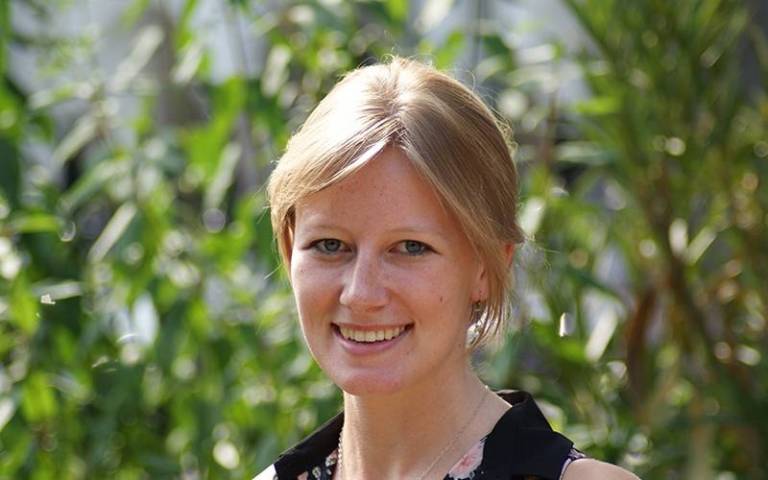UCL today announces a new WHO Collaborating Centre for Arts & Health, building on a long-standing partnership to advance our understanding of how the arts, culture, and heritage affect our mental and physical health.

The World Health Organisation (WHO) has designated UCL's Psychobiology Group in the Department of Behavioural Science and Health as a WHO Collaborating Centre on Arts & Health - the first of its kind in the world.
WHO collaborating centres are recognised as world-leading institutions of excellence in their field. The WHO Collaborating Centre for Arts & Health will be a four-year collaboration between UCL and the WHO/Europe Behavioural and Cultural Insights Unit.
The new Collaborating Centre for Arts & Health, which is part of a WHO Collaborating Centre Technical Network on Behavioural and Cultural Insights, aims to:
1. Carry out world-class research into how the arts, culture and heritage affect mental and physical health, build stronger communities and reduce inequalities.
2. Work with world-leading researchers in the UK and internationally to develop and improve arts and health policy globally.
3. Provide training programmes, toolkits, and resources to support development in the field, including facilitating opportunities for early career researchers.
As part of the new Collaborating Centre, UCL will work with WHO on the analysis and dissemination of data from longitudinal cohort studies on the long-term impact of arts and cultural engagement on mental and physical health and the mechanisms underlying these effects.
The Collaborating Centre will also work with governments internationally on policy development to support the use of the arts to help achieve global development goals, including on wellbeing, social cohesion, education and community development. Further work will include supporting the international roll-out of arts programmes to support specific health goals.
Already, the Collaborating Centre is working with the WHO Behavioural and Cultural Insights team to tailor an intervention for new mothers experiencing post-natal depression that has been successful in UK contexts (singing for new mums) for international settings in Romania and Denmark.
Dr Daisy Fancourt (UCL Institute of Epidemiology & Healthcare), Director of the new centre, said: "This is a huge milestone for UCL. It recognises our long-standing partnership with the WHO on arts and health and the phenomenal work that our interdisciplinary teams of academics, community organisations and policy groups have done to advance research and policy for improving health through arts and culture.
"The arts play a vital role in supporting health and wellbeing across the world. Amidst a global pandemic, singing from balconies, painting rainbows and streaming performances have helped to sustain hope, reduce loneliness and support mental health. The increasing use of social prescribing in the UK and internationally is a further testament to the importance of integrating medicine with creativity, culture and communities.
"The new Collaborating Centre for Arts & Health will allow us at UCL to expand its work in this fascinating and important topic and enable us to connect with and support programmes happening around the world. Through the Collaborating Centre, we aim to bring the arts and culture into the mainstream of public health and healthcare."
Nils Fietje, from the Behavioural and Cultural Insights Unit at the WHO Regional Office for Europe, said:"We are delighted to welcome the Psychobiology Group in the Department of Behavioural Science and Health at UCL as the first WHO Collaborating Centre in this field. Already the unprecedented work of UCL in this space has helped to change our understanding of the immense power contained within arts and cultural engagement to influence mental and physical health. The Centre will help us to join forces with countries across the European Region to bring this work to the forefront of public health research."
Dr Michael Spence, President & Provost of UCL, said: "We are proud to become a WHO Collaborating Centre for Arts & Health. This designation will allow us to build upon years of successful work that we have already undertaken with the World Health Organization. It also consolidates UCL's position as a world-leading research institution in arts and health. I look forward to the results of this collaboration positively influencing people's lives across the world."
The centre builds on four years of prior work between UCL and WHO on arts and health, which included the publication of a Health Evidence Synthesis Report bringing together the evidence from over 3,000 studies on the role of the arts in the promotion of good health and wellbeing, the prevention of mental and physical illness and the management and treatment of health conditions. The report was named the 2019 Global Aesthetic Achievement of the Year and was the most downloaded WHO/Europe publication of 2019.
The WHO Collaborating Centre for Arts & Health will join a network of over 700 collaborating centres covering different health topics in 80 countries worldwide.
Two other WHO Collaborating Centres are currently based at UCL. The Dental Public Health Group, at the UCL Institute of Epidemiology & Healthcare, is a WHO Collaborating Centre for Oral Health Inequalities and Public Health, working with the WHO on a global report on oral health. The Global Disability Innovation Hub (GDI Hub), hosted by UCL, is a WHO Collaborating Centre on Assistive Technology, which will focus on global disability innovation, creating a fairer world through access to assistive and accessible technology.
A formal launch of the new Collaborating Centre for Arts & Health will take place on Wednesday 13 October 2021 in partnership with the UKRI-funded MARCH Mental Health Network led by Dr Fancourt. MARCH focuses on social, cultural and community assets and the role they play in enhancing public mental health and wellbeing, preventing mental illness, and supporting those living with mental health conditions.






